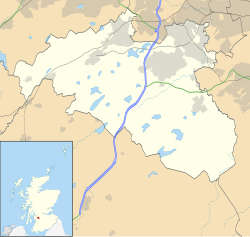| Uplawmoor | |
|---|---|
 Loch Libo and Uplawmoor from the air | |
Location within East Renfrewshire | |
| Population | 690 (2020) [1] |
| OS grid reference | NS434552 |
| Council area | |
| Lieutenancy area | |
| Country | Scotland |
| Sovereign state | United Kingdom |
| Post town | GLASGOW |
| Postcode district | G78 |
| Dialling code | 01505 |
| Police | Scotland |
| Fire | Scottish |
| Ambulance | Scottish |
| UK Parliament | |
| Scottish Parliament | |
Uplawmoor is a village in East Renfrewshire, Scotland. Its population was 700 as of 2016.
Contents
Historic Uplawmoor, [2] associated for centuries with the Barony of Caldwell and the Mure family, is still a vibrant community today, although bereft of the shops once to be found there. It has a primary school, hotel (Uplawmoor Hotel), village hall (Mure Hall), sports ground for tennis and football (including a playpark) and a golf club (Caldwell Golf Club). Nearby is the extensive Caldwell Estate with the roofless 18th century Caldwell House, which was designed by Robert Adam. The separate Caldwell Tower, of probable 16th century origin, is visible from the village. Several farms surround the village, as agriculture has always been of importance locally.
Historically the village was served by two railway lines – Lanarkshire and Ayrshire and Glasgow, Barrhead and Kilmarnock Joint Railway
Uplawmoor has a rural setting, with farmland on one side and mainly beech woodland (Pollick Glen and Shillford Woods, with numerous paths) on the other. Below lies the valley where are the A736 and Loch Libo, a Scottish Wildlife Trust Site Of Special Scientific Interest, the winter home of flocks of whooper swans. At the end of the loch is an area of large tussock sedges and on the far side is a striking waterfall among more woodland. The old hamlet of Shillford lies towards Neilston on the A736.


